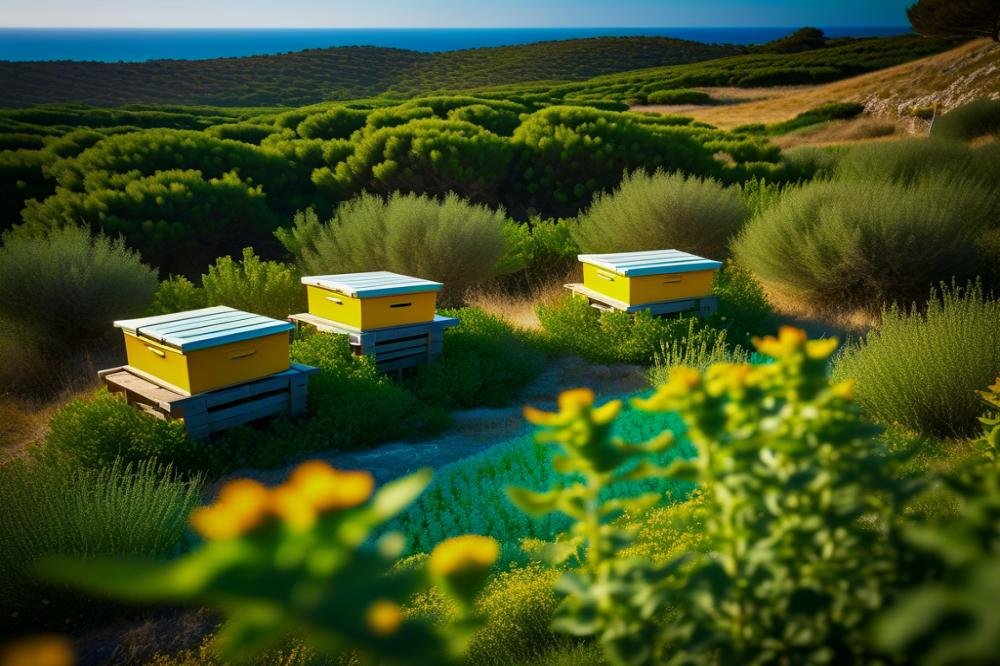Discovering Culinary Adventures in Greece
In the heart of Greece, culinary adventures beckon travelers to explore flavors rooted in history and tradition. For those seeking a taste of the authentic, Traditional Honey Farms in Rhodes offer a captivating experience. Here, visitors can witness the age-old art of beekeeping, which has flourished for centuries within Greek culture. This practice is not merely an agricultural endeavor; it forms a vital part of the landscape in which local culinary traditions thrive.
beekeeping has a rich historical significance in Greece. It showcases the connection between nature and culture that has persisted through generations. The production of honey, especially the renowned Greek honey, is celebrated not only for its sweetness but also for its health benefits. This golden nectar serves as an integral ingredient in various traditional recipes, from delightful pastries to savory dishes.
At these farms, local artisans passionately engage in sustainable farming, nurturing bees and their environments. Their commitment to organic honey production reflects a respect for nature’s balance and a desire to provide pure, flavorful products. Visitors can tour apiaries, where they learn about the lifecycle of bees and the importance of pollination for the ecosystem.
Rural tourism is becoming increasingly popular, and Rhodes is no exception. Travelers are encouraged to immerse themselves in this agricultural heritage. By participating in hands-on culinary experiences and tastings, guests develop a deep appreciation for the local landscape and the labor that goes into producing delightful honey. In addition, these interactions with local farmers bring about a unique bond with the community, enhancing the overall adventure.
Exploring the Traditional Honey Farms in Rhodes reveals not just a taste of honey, but a blend of culture, history, and sustainability, providing a truly enriching experience for every visitor.
Traditional Honey Farms

Exploring the traditional honey farms of Rhodes reveals a fascinating glimpse into the age-old practice of beekeeping. These farms are often small-scale and family-owned, where local artisans dedicate their lives to the craft. Each apiary showcases the deep connection between the beekeepers and their land. They operate in harmony with nature, using methods passed down through generations.
Honey production on these farms is a meticulous process. Beekeepers start by carefully selecting bee species best suited for the local flora. This choice affects not only the quantity of honey produced but also its flavor profile. The bees collect nectar from a variety of wildflowers and herbs, which are abundant across the island. These natural resources contribute significantly to the richness of Greek honey.
Artisanal practices distinguish these farms from mass-production facilities. For instance, many beekeepers avoid the use of chemicals or artificial additives. They prioritize organic honey by implementing sustainable farming practices. This commitment helps preserve the environment and supports bee health. Without harmful substances, the bees produce healthier honey, full of flavor and nutrients.
The importance of rural tourism cannot be overlooked, as visitors flock to these farms for culinary experiences. Tourists are keen to learn about the process, tasting fresh honey straight from the comb. This interaction helps keep traditional methods alive while supporting the local economy. Sharing their passion for beekeeping, artisans often provide workshops that engage visitors.
Each jar of honey from Rhodes tells a story. It represents not just the efforts of the beekeepers but also the island’s rich agricultural heritage. The labor put into each batch highlights the uniqueness of the local landscape. By choosing organic honey, consumers contribute to sustaining these practices and preserving the quality of this cherished product.
The Art of Beekeeping

Beekeeping on the island of Rhodes is not just a job; it’s an art form rooted in tradition. Many local beekeepers have techniques passed down through generations. These skills vary widely but are all focused on creating the best conditions for bees to thrive. The ancient practice of maintaining apiaries is essential for honey production here.
Rhodes is home to a few different types of bees, with the most notable being the native Greek bee. This species is well-adapted to the local climate. As a result, they produce a distinct flavor profile in their honey. Local enthusiasts take pride in their organic honey, which is often harvested from the abundant wildflowers found throughout the island.
The relationship between bees and their environment is delicate yet vital. Local artisans play a crucial role in promoting biodiversity. They work hard to practice sustainable farming methods that benefit both the bees and the landscape. By planting diverse flora, they help sustain bee populations. In turn, these practices boost the quality of the honey produced.
Rural tourism is on the rise, with visitors eager to learn about this important agricultural heritage. Travelers can participate in culinary experiences that include honey tastings and cooking classes using local honey. These activities deepen an understanding of how honey is made and its significance in Greek culture.
Artisans in the area also focus on eco-friendly methods during honey production. This commitment to sustainability protects the natural habitat of the bees. Innovative techniques are employed to enhance bee health and honey quality. By fostering a strong bond between the bees and their surroundings, they contribute to the ecosystem’s overall health.
Families working on traditional honey farms often share their passion with visitors. Learning about the intricate process of beekeeping provides a unique insight into how hard work leads to delicious honey. These experiences create a lasting impression and appreciation for the significance of bees in our environment.
As you explore Rhodes, observe how beekeeping intertwines with daily life. The rhythms of the bees reflect the natural seasons, reminding us of the beauty in balance. Understanding this connection between bees, flowers, and the land enriches our appreciation for the island’s rural landscape and its culinary gifts.
Types of Greek Honey

In Rhodes, a rich variety of honey captivates the senses. This region is known for its diverse floral sources, ranging from wild thyme to pine. Such plants contribute distinct flavors and colors to the honey produced here. Each type reflects the island’s unique landscape and climate, showcasing what nature has to offer.
Beekeeping plays a vital role in the local culture. Rhodian honey often displays vibrant shades, from deep amber to light golden hues. Wildflowers, particularly those that thrive in the Mediterranean climate, influence these colors. Honey made from thyme is especially popular for its robust flavor. This variety is thick and aromatic, perfect for drizzling over yogurt or using in traditional dishes.
Apiaries dot the countryside, where local artisans practice sustainable farming methods. These practices emphasize organic honey production without harsh chemicals. The result is a pure product that not only tastes better but also supports the environment. Floral varieties like chestnut and citrus blossom further enhance the selections available. Chestnut honey has a darker color and a slightly bitter taste, making it great for pairing with cheeses.
Regional specialties emerge from these dedicated efforts. For example, honey infused with herbs, such as sage or rosemary, adds depth to culinary experiences. It’s common to find these flavors in traditional Greek desserts. Baklava and other pastries often use honey sourced from local beekeepers to maintain authenticity. Each jar carries a story of its origins, truly reflecting the agricultural heritage of Rhodes.
Rural tourism thrives in areas where honey is a focal point. Visitors can engage with local artisans, learn about the beekeeping process, and sample various types of honey. Each tasting offers a chance to appreciate how different floral sources influence taste. These experiences create lasting memories while supporting the sustainable practices of the local community. Enjoying honey as a part of a meal not only enhances flavors but also connects diners to the land and its traditions.
Rural Tourism and Culinary Experiences

Rural tourism plays a crucial role in promoting traditional honey farms in Rhodes. Visitors can immerse themselves in the world of beekeeping, where they discover the intricate art of honey production. Engaging fully with local artisans creates a vibrant connection to the land and its practices. This tourism helps sustain small farms and fosters a deeper appreciation for sustainable farming techniques.
Many opportunities exist for friends and families to participate in honey tastings. These experiences allow guests to sample various kinds of Greek honey, each with its own distinct flavor profile. From lighter, floral varieties to rich, robust options, each tasting becomes an exploration of nature’s sweetness. Workshops often accompany these tastings, where people can learn how to craft their natural products using honey.
Guided tours of local apiaries offer an inside look at how bees live and work. Visitors get to see firsthand the hives and the bustling activity around them. Knowledgeable guides share stories about the bees and discuss their vital role in agricultural heritage. This educational aspect adds depth to the experience, showing how crucial honeybees are for the environment.
Sharing these culinary experiences doesn’t just involve honey. Many farms prepare meals featuring local ingredients that often include honey as a key element. Guests can relish dishes that have been passed down through generations, showcasing the rich culture of Greek cuisine. It’s a wonderful way to taste the connection between the land and its bounty.
Through the lens of rural tourism, visitors gain insight into the lives of beekeepers and their commitment to organic honey. Each farm presents its unique practices, contributing to a beautiful mosaic of traditions. As they explore Rhodes, travelers become part of a larger movement that values local products and sustainability.
Supporting Local Artisans
Tourism plays a crucial role in the lives of local artisans in Rhodes. Visitors often seek out authentic experiences, and this leads to increased interest in traditional honey farms. Each trip to these farms helps sustain local economies. Their unique crafts are not just products; they contribute to the rich agricultural heritage of the area.
Support for sustainable farming practices is essential. Tourists can play their part by choosing to buy organic honey directly from beekeepers. Many artisans offer workshops that show the art of beekeeping. This hands-on approach not only deepens understanding but also strengthens community ties.
Rural tourism is an avenue for fostering connections between visitors and locals. By exploring apiaries, travelers can learn about the intricate process of honey production. They see how traditional methods are passed down through generations. Supporting these artisans means endorsing their commitment to preserving these practices.
Ethical sourcing is another aspect to consider. Many initiatives have emerged that focus on promoting local artisans and their products. This ensures that the benefits of tourism directly impact the community. Travelers are encouraged to look for shops or markets that highlight Greek honey and other local goods. Such efforts help maintain the authenticity of the region.
Culinary experiences offer another layer of interaction. Tasting unique varieties of honey allows visitors to appreciate the flavors of Rhodes. Local artisans often pair their honey with cheeses and breads, creating a delightful experience. Engaging with these culinary delights supports both bees and the people who care for them. The outcome is a richer, more rewarding experience for everyone involved.
Final Thoughts on Exploring Honey Farms in Rhodes
Discovering traditional honey farms in Rhodes opens a door to a delightful culinary adventure. Visitors to these farms get to experience the magic of Greek gastronomy firsthand. Beekeeping is a vital part of the island’s rich culture. It connects generations of artisans who craft their products with care. Their commitment to quality reflects deep-rooted traditions in honey production.
When exploring these farms, you encounter more than just sweet treats. Each farm shares stories about the land, the flowers, and the bees. These tales enhance the tasting experience, making it memorable. As you sample various honey flavors, the connection to local artisans becomes clear. They pour their hearts into every jar, showcasing the true essence of Rhodes.
Additionally, the focus on sustainable farming practices illustrates a strong bond between nature and community. Farmers prioritize the health of their bees and the environment. Such efforts help maintain the ecological balance and support biodiversity. Engaging with local honey producers reveals an agricultural heritage rich in pride and respect for the land.
Ultimately, diving into the world of honey in Rhodes is about more than just food. It is an opportunity to appreciate true craftsmanship and local strategies for sustainable living. Encouraging readers to explore this sweetness not only highlights the importance of supporting local businesses but also enriches understanding of Greece’s agricultural practices. A journey to these farms ensures that every visitor leaves with a taste of history and a greater appreciation for the beautiful connection of nature and culture.



